Submit Chapter news to Beacon Co-Editors and OES Chapter Coordinator
Japan Chapter
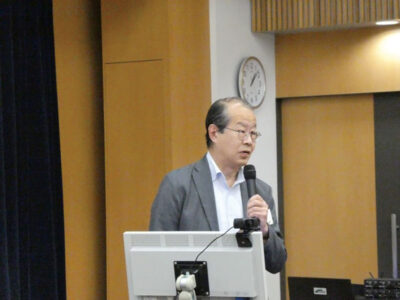
The 10th Underwater Technology Forum・ZERO HYBRID – congratulating Prof. Yutaka Michida elected to Chair UNESCO’s Intergovernmental Oceanographic Commission (IOC) for the 2023-2025 biennium
Reported by Harumi Sugimatsu
The 10th Underwater Technology Forum・ZERO was held from 13:00-17:00 on 13 October 2023, on the Atmosphere and Ocean Research Institute, The University of Tokyo in Kashiwa Campus (https://seasat.iis.u-tokyo.ac.jp/UTforum/UTforumzero10/). This time, we had 85 in person attendees and 133 online attendees who tend to live far from Tokyo. Among the speakers, two Japanese youths who are living in Norway and Estonia were online.
The Forum congratulated of Prof. Yutaka Michida of the University of Tokyo (Forum’s Co-Chair) on his election as Chair of IOC (https://www.ioc.unesco.org/en/ioc-officers), and opened the forum with a speech on the significance of the IOC’s existence and its future prospects. We then celebrated this at the reception after the forum.
Other topics of the forum are as below;
- The current abnormal Kuroshio meander and its future prospective
- The strange creatures of Kagoshima Bay, Satsuma Haorimushi, A close look at the adaptation mechanisms to the chemosynthetic ecosystem
- Port Development considering biological symbiosis at Suzaki Port in Kochi Prefecture
- Operation of AUV “MONACA” in the 64th Antarctic Research Exploration
- Development of the VTOL-UAV “Asuka” and its operation in whale observation
- Challenge to reproduce the marine ecosphere by the environmental transfer venture “INOCA”
- Report on Overseas part 1, working at a Norwegian Maritime Company
- Report on Overseas part 2, life in a doctoral course in Estonia
The next Forum (hybrid) will be held on 26 April 2024, at the Institute of Industrial Science, The University of Tokyo, in Komaba Research Campus. If you are interested to attend or give a talk, please contact us (harumis@iis.u-tokyo.ac.jp).
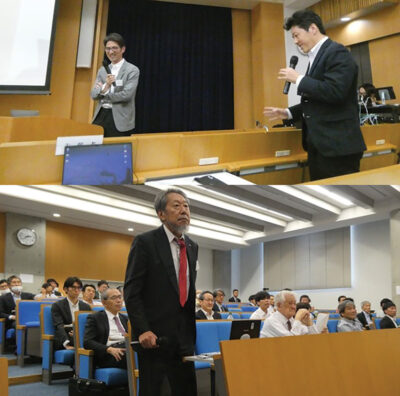
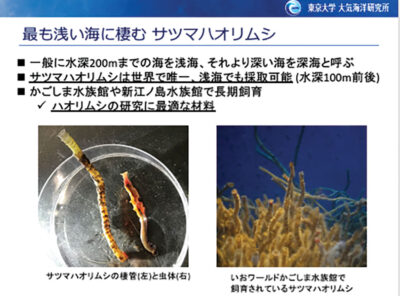
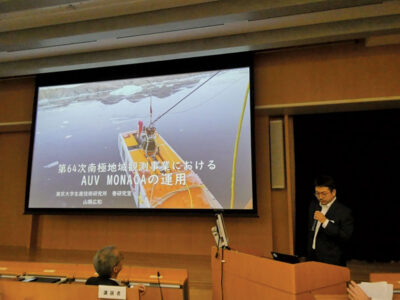
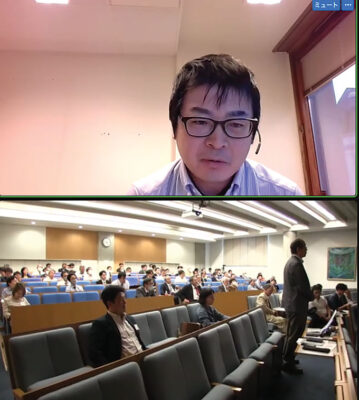
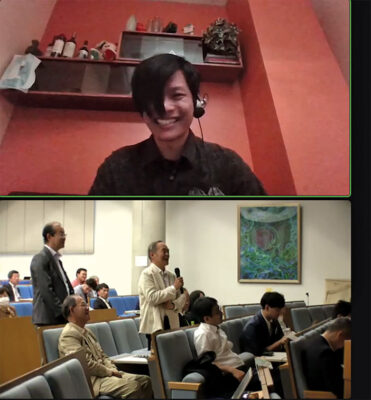
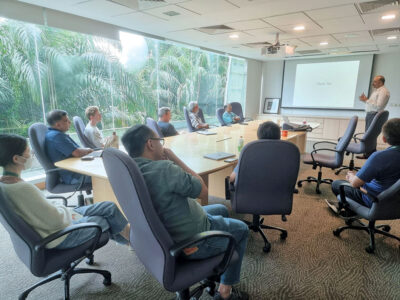
Singapore Chapter
Activities Report, 2023
Reported by Yuen Min Too, Hari Vishnu, Venugopalan Pallayil, Bharath Kalyan
In 2023, IEEE OES Singapore experienced a bustling year with a diverse range of activities, both technical and social. These encompassed technical talks and social gatherings.
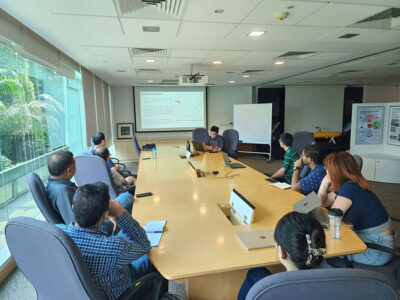
At the beginning of the year, we organized a talk featuring Dr. V. P. Harigovindan, an Associate Professor at the National Institute of Technology Puducherry, India. The presentation, titled “Non Orthogonal Multiple Access IOT networks for 5G and beyond” took place on January 26, 2023.
During the month of June, we hosted a technical presentation titled “Horizontal Coherence Function for Ambient Noise and Helicopter Sound in Water” by Mr. Kok Hong Jie, a representative from the Defence Science Organisation (DSO) National Laboratories. This talk explored both the theoretical underpinnings and practical applications of horizontal coherence functions, particularly their utility in estimating the speed of sound in sediment.
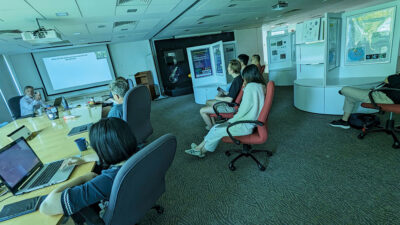
Later this year, we proudly hosted an IEEE Oceanic Engineering Society Distinguished Lecture (DL) featuring Professor John Potter from NTNU. On September 21, 2023, Professor Potter delivered an enlightening talk titled “Listening at the speed of light: what could distributed acoustic sensing do for you?”. During his presentation, he introduced the concept of Distributed Acoustic Sensing (DAS), a groundbreaking technology utilizing an array of sensors for passive acoustic sensing across a distributed area. Professor Potter provided a comprehensive overview of the manifold applications of DAS, encompassing diverse fields such as environmental monitoring, seismic activity analysis, passive acoustic monitoring of marine mammals, and traffic and transportation surveillance. His talk shed light on the far-reaching capabilities of DAS technology.
Immediately following the Distinguished Lecture, we had a technical talk by Dr. Dora Hu Juanjuan from Institute for Infocomm Research (I2R), A*STAR. The presentation was titled “Underground Asset Integrity Monitoring using Distributed Acoustic Sensing (DAS).” Dr. Hu Juanjuan provided an overview of the ongoing efforts in the realm of underground asset integrity monitoring, utilizing the cutting-edge DAS technology and machine learning.
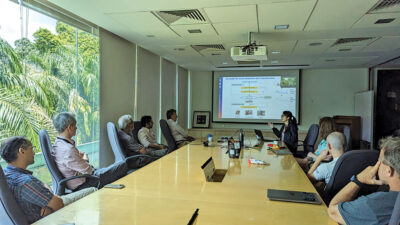
On the social side, the chapter also hosted the IEEE OES leadership Executive Committee meeting on 4-5 November, 2023. We also organized a social networking and membership drive barbecue on 4 November, 2023 at Republic Singapore Yacht Club, alongside the ExCom meeting, allowing members a chance to interact with ExCom members. Our chapter members have also been active in organizing or delivering technical talks and activities in other parts of the world. Our member Dr. Mandar Chitre delivered a DL talk in Israel at Haifa university on “Glacier monitoring in the Arctic.” Dr. Venu Pallayil helped organize a panel on low-cost ocean observing technologies at OCEANS Gulf Coast. Dr. Vishnu facilitated two well-attended webinars delivered in collaboration with the Early Career Ocean Professionals (ECOP) programme, delivered by TC chairs Dr. Suleiman Mazhar and Dr. Andreas Marouchos, on basics of acoustics and polar technologies respectively for ECOPs. Dr. Kalyan organized two technical sessions at Offshore Technology Conference, Houston, on Marine robotics.
We are in the midst of organizing two large upcoming events, namely the OES/MTS OCEANS 2024 conference in Marina Bay Sands, and the Singapore AUV Challenge 2024, our flagship chapter annual event to engage and promote student interest in underwater technology. It has been running very successfully for the past 11 years (every year except 2020-21 due to Covid) with excellent visibility. We are planning for an OES short school alongside these events led by the VP-TA.
We are also planning for an industrial workshop in December where several industrial representatives are expected to give talks on their latest developments with chapter members. Our member Dr. Chitre will be delivering a lecture in association with the robotics winter school being organized in the National Institute of Oceanography, Goa, India, in December. Our chapter members have also been active in the leadership of the society by being involved in various roles in ExCom such as VP-OCEANS, Secretary, and the Editor-in-Chief of JOE. One of our chapter members, Dr. Kalyan, received the 2023 IEEE OES Presidential Award for his service rendered to the Singapore Chapter, SAUVC, and the OES Technology Committees, and has been nominated to AdCom as well. Also, another matter of pride for our chapter is that we were awarded the Best Chapter award in the Singapore Section in 2022, for our activities.
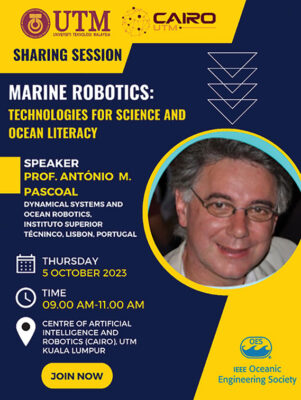
Malaysia Chapter
SHARING SESSION BY VISITING PROFESSOR ANTÓNIO PASCOAL ON MARINE ROBOTICS TECHNOLOGIES FOR SCIENCE AND OCEAN LITERACY AT UNIVERSITI TEKNOLOGI MALAYSIA
Reported by Assoc. Prof. Ir Dr Zool Hilmi Ismail, Chapter Chair
On October 5th, 2023, Dr. António Pascoal, a visiting professor from the Dynamical Systems and Ocean Robotics Lab in Lisbon, Portugal, delivered a sharing session on Marine Robotics Technologies for Science and Ocean Literacy at the Center for Artificial Intelligence and Robotics, Universiti Teknologi Malaysia, Kuala Lumpur. Dr. Pascoal, a Life Member of IEEE, is a renowned figure in the field of Marine Robotic Technologies, with significant contributions to both science and ocean literacy, starting from his academic achievement of earning a Ph.D. in control science from the University of Minnesota, Minneapolis, MN, USA, in 1987. Pascoal’s expertise and interest in the oceanic realm led him to take on a role as an Adjunct Scientist with the National Institute of Oceanography in Goa, India, in 2012. This position allowed him to extend his research and influence in marine technology on an international scale.
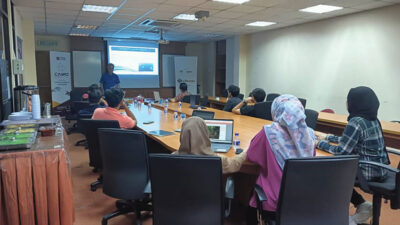
Pascoal’s work in marine robotic technologies is characterized by his efforts to develop systems that can navigate and understand the complex and often unpredictable marine environment. His research has implications for various applications, from environmental monitoring and oceanographic data collection to underwater infrastructure inspection and maintenance. Through his roles, António M. Pascoal has significantly contributed to the field of marine robotics, positioning himself as a leading figure in the advancement of technologies that are pivotal for ocean exploration and the dissemination of ocean literacy. His career reflects a deep commitment to harnessing technology for understanding and preserving the marine environment, making substantial contributions to the field of marine science and robotics.
During the sharing session, Dr. Pascoal presented the historical development and usage of robotic systems designed by Instituto Superior Técnico for marine environments. These technologies include autonomous underwater vehicles (AUVs), remotely operated vehicles (ROVs), and unmanned surface vehicles (USVs). These systems are equipped with sensors, cameras, and sometimes manipulative tools to perform tasks such as data collection, mapping, sampling, and inspecting underwater infrastructure.
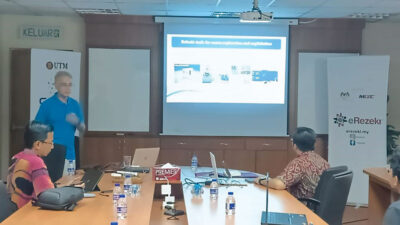
Furthermore, he also discussed how these technologies enhance our understanding of the ocean’s influence on us and our impact on the ocean. Marine robotics technologies significantly contribute to ocean literacy by providing data and visuals that assist in educating people about the marine environment. Through the data collected by marine robots, scientists, educators, and the public can gain insights into the ocean’s health, biodiversity, and the challenges it faces.
Lastly, he explained that operating in the harsh and unpredictable ocean environment poses unique challenges. This leads to continuous innovation in areas such as robotics durability, energy efficiency, navigation, and data transmission.
THE 13TH NATIONAL TECHNICAL SEMINAR ON UNMANNED SYSTEM TECHNOLOGY 2023 (NUSYS’23)
THEME: “Advancing GLOBAL Sustainability through Technological Breakthroughs”
Reported by Prof. Dr Mohd Rizal Arshad and Assoc. Prof. Ir Dr Zool Hilmi Ismail
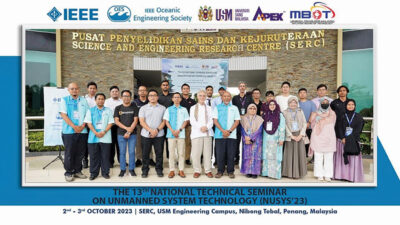
The 13th National Technical Seminar on Unmanned System Technology, NUSYS’23, hosted on October 2nd and 3rd, 2023, at Universiti Sains Malaysia, Nibong Tebal in Penang, Malaysia, and organized by IEEE OES Malaysia, was a pivotal event that brought together a diverse group of professionals to discuss advancements in unmanned system technologies. The seminar was a confluence of researchers, scientists, engineers, academicians, and industry experts from around the world, sharing insights on a wide array of topics such as Unmanned Systems, Underwater Technology, Marine Power Systems, Sustainable Energy, Applied Electronics, Computer Engineering, Control Systems, Instrumentation, and Artificial Intelligence.
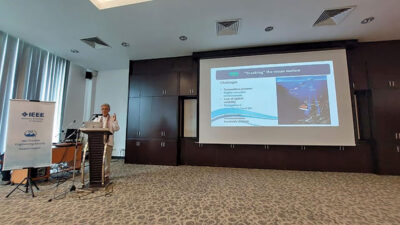
The event commenced with a Welcoming Remark and Opening Ceremony by Prof. Dr. Mohd Azmier Ahmad, the Director of the Science and Engineering Research Centre at USM. His opening address set the tone for the seminar, emphasizing the importance of innovation and collaboration in the field of unmanned system technologies. This was followed by a Welcoming Remark by Assoc. Prof. Ir. Dr. Zool Hilmi Ismail, Chair of the IEEE OES Malaysia Chapter, who highlighted the chapter’s commitment to advancing the field and fostering an environment conducive to knowledge exchange and networking. Keynote presentations were delivered by esteemed speakers: Prof. Dr. Antonio Pascoal from the Dynamical Systems and Ocean Robotics Lab in Lisbon, Portugal, and Professor Huiping Li from the School of Marine Science and Technology at Northwestern Polytechnical University in Xi’an, China. These sessions provided attendees with valuable insights into cutting-edge research and developments in the field.
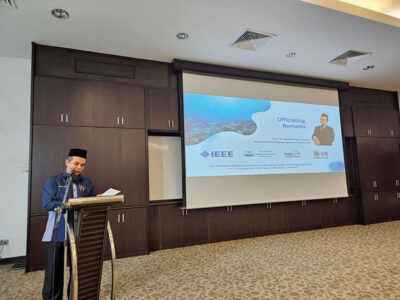
Additionally, NUSYS’23 featured special talks from industry leaders. Dr. Hairi Zamzuri of eMooVit Technology Sdn Bhd and Mr. Kamarul Hisham Kamarulzaman from SS ROVER Sdn Bhd shared their industry experiences and perspectives, offering a practical viewpoint on the application of unmanned system and ROV technologies. A notable feature of the seminar was the announcement that all accepted and presented papers would be submitted for inclusion in the SCOPUS-indexed Springer LNEE (Lecture Notes in Electrical Engineering) Proceedings, providing a significant publication platform for participants’ research. The seminar also focused on exploring innovative technologies for resource utilization, formulating strategies for ecological conservation, and envisioning the future of emerging technologies. With over 30 technical papers presented, the event provided a rich environment for learning, discussion, and collaboration.
In closing, heartfelt thanks were extended to all partners, volunteers, and the University of Science Malaysia for their invaluable support and hospitality, which were pivotal in the success of NUSYS’23. The technical seminar was not only a platform for sharing and discussing research but also an inspiring event, leaving participants with a renewed sense of purpose and a broader perspective on the possibilities in the field of unmanned systems.
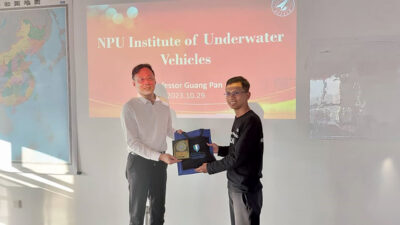
IEEE OES Malaysia Chapter and Northwestern Polytechnical University Joint Technical Seminar and Cultural Exploration
Reported by Prof. Dr Mohd Rizal Arshad, Assoc. Prof. Ir Dr Zool Hilmi Ismail, Ts Dr Zainah Binti Md. Zain and Dr Maziyah Binti Mat Noh
A group of distinguished academics and researchers from the OES Malaysia Chapter and Northwestern Polytechnical University (NPU) recently came together for an enriching four-day event at Northwestern Polytechnical University in Xi’an, China. The delegation included prominent figures such as Professor Dr. Mohd Rizal Arshad from OES Malaysia Chapter team, Professor Dr. Guang Pan and Professor Dr. Huiping Li from NPU, among other esteemed guests. The program commenced with a comprehensive Joint Tech Seminar, followed by an exploration of the historical treasures of Xi’an.
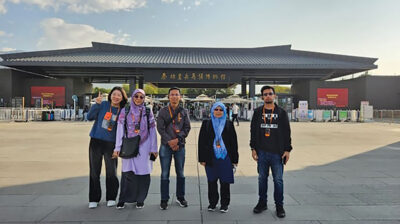
Day 1: Joint Tech Seminar
The event began on 31 October 2023 with the Joint Tech Seminar. Starting at 9:00 AM, the seminar featured a series of insightful presentations from both OES Malaysia Chapter and NPU teams. These presentations covered diverse topics, from breakthroughs in technology to collaborative research achievements and insights into future tech trends. The morning session was rich in intellectual discourse, fostering a spirit of learning and collaboration.
After the lunch break, the afternoon was dedicated to discussion sessions, providing practical insights into various technological fields. This provided a unique opportunity for hands-on learning and potential research collaborations. The day concluded with an interactive Q&A session, enabling a lively discussion and concluding remarks from the organizer.
The evening was reserved for a networking dinner, where participants engaged in informal discussions, shared ideas, and built professional connections.
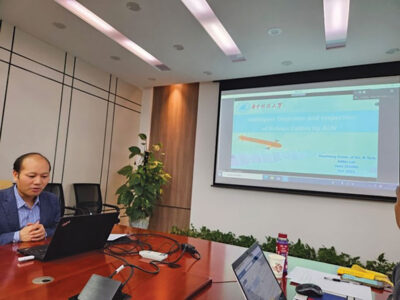
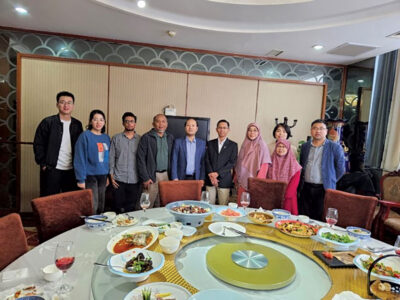
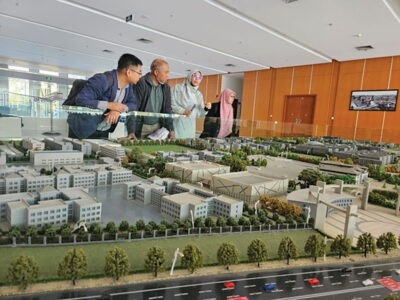
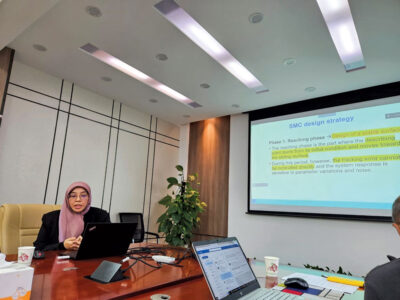
Day 2: Tour of Xi’an
The final day of the event was a cultural tour of Xi’an. The morning began with a visit to the legendary Terracotta Army, offering attendees a peek into China’s rich historical heritage. The visit was both enlightening and inspiring, showcasing the artistic and cultural achievements of ancient China.
In the afternoon, after a delightful lunch at a local restaurant, the group toured the Ancient City Wall and the Big Wild Goose Pagoda. These sites are not only significant for their historical and cultural value but also stand as testaments to the seamless blend of ancient traditions and modern developments characteristic of Xi’an.
The day concluded with participants having the option to extend their stay, allowing further exploration of this vibrant city.
This event was more than just an academic conference; it was an immersion into culture, blending the exploration of technological advancements with the appreciation of historical and cultural heritage. The participants left with enhanced knowledge, potential collaborative prospects, and a deeper understanding of Xi’an’s rich cultural backdrop.
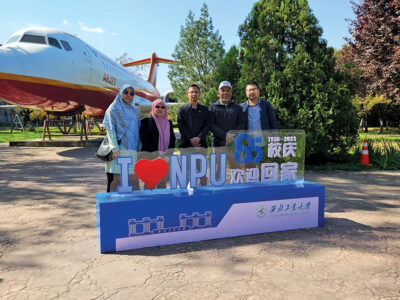
COMMITTEE MEETING AND COLLABORATIVE EFFORTS BETWEEN NPU & IEEE OES MALAYSIA CHAPTER FOR USYS’24
Reported by rof. Dr. Mohd Rizal Arshad, Assoc. Prof. Ir. Dr. Zool Hilmi Ismail, Ts. Dr. Zainah Binti Md. Zain and Dr. Maziyah Binti Mat Noh
The recent collaboration between the IEEE Oceanic Engineering Society (OES) Malaysia Chapter, Northwestern Polytechnical University (NWPU), and Huazhong University of Science and Technology (HUST) marks a significant stride towards the upcoming USYS’24. This gathering aimed not only to strengthen ties but also to lay down a concrete plan for the conference scheduled for next year in Xi’an, China. The visit included a comprehensive tour of NWPU’s research facilities and marine labs, followed by in-depth discussions led by Professor Huiping Li from NWPU and Professor Xiang Bo, along with his team from HUST Wuhan.
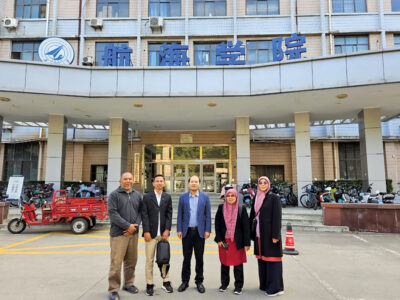
Tour and Visit to NWPU Research Facilities and Marine Labs
The day commenced with an insightful tour of NWPU’s cutting-edge research facilities. The visit showcased a variety of technological innovations and projects, each aligning with the broader objectives of USYS’24. Particularly impressive were the advanced marine research labs, where a plethora of ongoing projects displayed NWPU’s commitment to marine science and technology. These labs, equipped with state-of-the-art apparatus, are pivotal in advancing research in underwater acoustics, marine robotics, and other related fields, directly contributing to the themes of USYS’24.
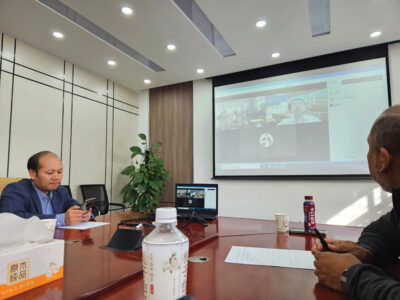
Lunch and Discussions on USYS24
Post the tour, the delegation gathered at the NWPU cafeteria for lunch. This provided an informal setting for preliminary discussions, setting the stage for the afternoon session. The main discussion, focused on the upcoming USYS’24 conference, was both comprehensive and detailed. Key topics included conference themes, paper submission guidelines, panel discussions, keynote speeches, and logistical arrangements for the event in Xi’an. Professors Huiping Li and Xiang Bo spearheaded the conversation, emphasizing the need for a multidisciplinary approach and international collaboration in addressing the challenges and opportunities in ocean engineering and technology.
Planning and Technical Discussion for USYS’24 Conference Organization
The core of the meeting revolved around the meticulous planning of USYS’24. Discussions delved into the technical aspects of the conference, including session formats, publication protocols, and the integration of innovative research findings. The team also outlined a roadmap for engaging global experts, securing local sponsorships, and facilitating smooth execution. A significant portion of the dialogue was dedicated to ensuring a diverse and inclusive paper submission platform, allowing researchers from various backgrounds to contribute and benefit. The visit to NWPU and the subsequent discussions with IEEE OES Malaysia Chapter, NWPU, and HUST representatives have laid a solid foundation for the successful organization of USYS’24. The emphasis on collaboration, innovation, and inclusivity resonated throughout the day’s events, setting a promising tone for next year’s conference. The upcoming months will see these plans refined and implemented, gearing up for what promises to be a landmark event in the field of ocean engineering. Key details for USYS 2024 include a proposed date of October 18-20, 2024 in Xi’an, China, with an aim for more than 100 presented papers, and important deadlines for paper submissions set throughout 2024.


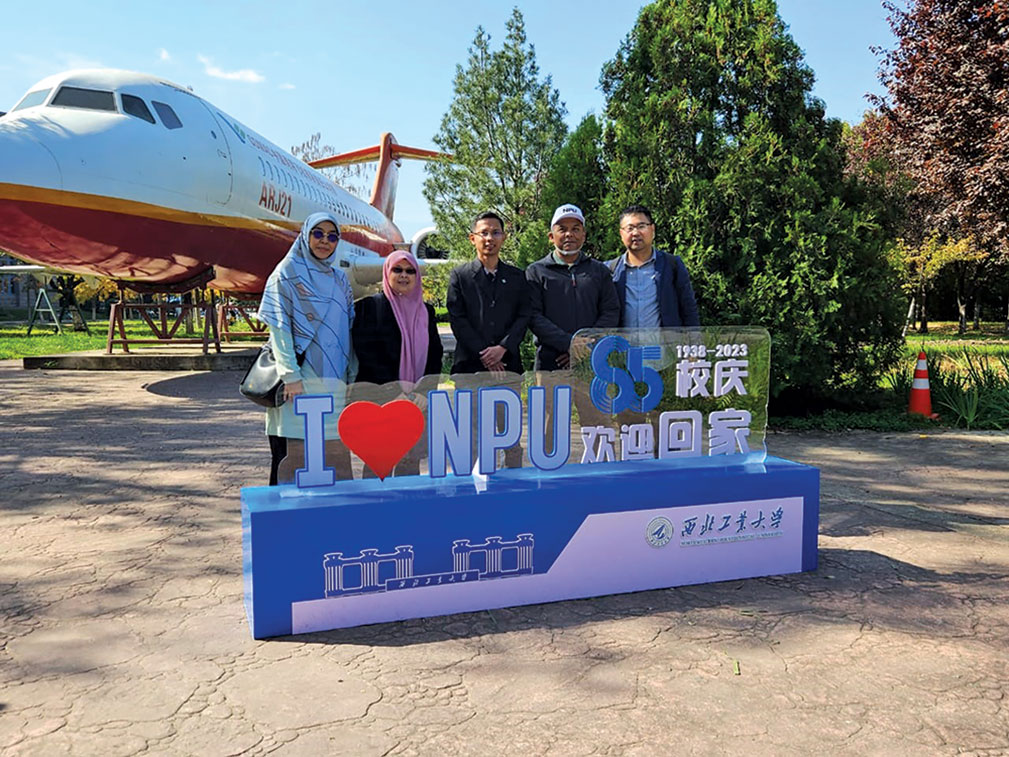
 Suleman Mazhar has been working as a professor in Information & Communication Engineering at Harbin Engineering University (China) since July 2019. He did PhD from Tokyo University (Japan) and postdoctorate from Georgetown University (Washington DC, USA). He had BS-CS from FAST-NUCES (Lahore) and MS from GIK Institute (Pakistan). He is TYSP young scientist fellow (Ministry of Science & Technology China) and have won several research grants from international organizations such as DAAD (Germany), ICIMOD (Nepal), NRPU (Higher Education Commission Pakistan), WWF (Worldwide Fund for Nature) Pakistan. His research focus is deep learning and signal processing applications for environmental monitoring, with particular focus on underwater acoustics, and marine mammal conservation. He is a reviewer for professional journals such as Journal of Acoustical Society (America), IEEE Journal of Oceanic Engineering, IEEE Sensors Journal, Applied Acoustics, IEEE Transactions on Intelligent Transportation Systems.
Suleman Mazhar has been working as a professor in Information & Communication Engineering at Harbin Engineering University (China) since July 2019. He did PhD from Tokyo University (Japan) and postdoctorate from Georgetown University (Washington DC, USA). He had BS-CS from FAST-NUCES (Lahore) and MS from GIK Institute (Pakistan). He is TYSP young scientist fellow (Ministry of Science & Technology China) and have won several research grants from international organizations such as DAAD (Germany), ICIMOD (Nepal), NRPU (Higher Education Commission Pakistan), WWF (Worldwide Fund for Nature) Pakistan. His research focus is deep learning and signal processing applications for environmental monitoring, with particular focus on underwater acoustics, and marine mammal conservation. He is a reviewer for professional journals such as Journal of Acoustical Society (America), IEEE Journal of Oceanic Engineering, IEEE Sensors Journal, Applied Acoustics, IEEE Transactions on Intelligent Transportation Systems. Peng Ren is a full professor with the College of Oceanography and Space Informatics, China University of Petroleum (East China). He is the director of Qingdao International Research Center for Intelligent Forecast and Detection of Oceanic Catastrophes. He received the K. M. Scott Prize from the University of York, the Natural Science award (first rank) from China Institute of Electronics, and the Eduardo Caianiello Best Student Paper Award from 18th International Conference on Image Analysis and Processing as one co-author. He has served as an associate editor of IEEE Transactions on Geoscience and Remote Sensing.
Peng Ren is a full professor with the College of Oceanography and Space Informatics, China University of Petroleum (East China). He is the director of Qingdao International Research Center for Intelligent Forecast and Detection of Oceanic Catastrophes. He received the K. M. Scott Prize from the University of York, the Natural Science award (first rank) from China Institute of Electronics, and the Eduardo Caianiello Best Student Paper Award from 18th International Conference on Image Analysis and Processing as one co-author. He has served as an associate editor of IEEE Transactions on Geoscience and Remote Sensing. Mohd Rizal Arshad is a full professor at the School of Electrical and Electronic Engineering at Universiti Sains Malaysia (USM), Malaysia, where he specializes in ocean robotics technology and intelligent system. He received his B.Eng. in Medical Electronics & Instrumentation and PhD in Electronic Engineering from University of Liverpool, UK in 1994 and 1999, respectively. He completed his MSc. in Electronic Control Engineering from the University of Salford, UK in Dec 1995. He has supervised many postgraduate students and published extensively in local and international publications. He is a senior member of the IEEE, and was awarded IEEE OES Presidential Award in 2019.
Mohd Rizal Arshad is a full professor at the School of Electrical and Electronic Engineering at Universiti Sains Malaysia (USM), Malaysia, where he specializes in ocean robotics technology and intelligent system. He received his B.Eng. in Medical Electronics & Instrumentation and PhD in Electronic Engineering from University of Liverpool, UK in 1994 and 1999, respectively. He completed his MSc. in Electronic Control Engineering from the University of Salford, UK in Dec 1995. He has supervised many postgraduate students and published extensively in local and international publications. He is a senior member of the IEEE, and was awarded IEEE OES Presidential Award in 2019. Itzik Klein is an Assistant Professor, heading the Autonomous Navigation and Sensor Fusion Lab, at the Charney School of Marine Sciences, Hatter Department of Marine Technologies, University of Haifa. He is an IEEE Senior Member and a member of the IEEE Journal of Indoor and Seamless Positioning and Navigation (J-ISPIN) Editorial Board. Prior to joining the University of Haifa, he worked at leading companies in Israel on navigation topics for more than 15 years. He has a wide range of experience in navigation systems and sensor fusion from both industry and academic perspectives. His research interests lie in the intersection of artificial intelligence with inertial sensing, sensor fusion, and autonomous underwater vehicles.
Itzik Klein is an Assistant Professor, heading the Autonomous Navigation and Sensor Fusion Lab, at the Charney School of Marine Sciences, Hatter Department of Marine Technologies, University of Haifa. He is an IEEE Senior Member and a member of the IEEE Journal of Indoor and Seamless Positioning and Navigation (J-ISPIN) Editorial Board. Prior to joining the University of Haifa, he worked at leading companies in Israel on navigation topics for more than 15 years. He has a wide range of experience in navigation systems and sensor fusion from both industry and academic perspectives. His research interests lie in the intersection of artificial intelligence with inertial sensing, sensor fusion, and autonomous underwater vehicles. John R. Potter (IEEE M’94, SM’02, F’18) graduated in the previous century with a joint honours Mathematics and Physics Degree from Bristol and a PhD. in Glaciology and Oceanography from Cambridge, UK studying Antarctic ice mass balance, where he spent four consecutive summers. This work helped underscore the non-linear fragility of polar ice to climate change and led to him receiving the Polar Medal from Queen Elizabeth II in 1988.
John R. Potter (IEEE M’94, SM’02, F’18) graduated in the previous century with a joint honours Mathematics and Physics Degree from Bristol and a PhD. in Glaciology and Oceanography from Cambridge, UK studying Antarctic ice mass balance, where he spent four consecutive summers. This work helped underscore the non-linear fragility of polar ice to climate change and led to him receiving the Polar Medal from Queen Elizabeth II in 1988. Nick is a Visiting Fellow at the UK National Oceanographic Center, Southampton His nomination was endorsed by the Underwater Acoustics Technology Committee. He had worked as a Research Associate and Lecturer at University of Birmingham and has been working as a Research Scientist at the Applied Research Laboratory, University of Texas, Austin. He has also served as a Program Officer at the Office of Naval Research Global. He is a senior member of IEEE (OES) and a Fellow of Acoustical Society of America (ASA). Nick has also been serving as Assoc. Editor for IEEE JoE and JASA. He is widely acknowledged for his expertise are seabed acoustics, parametric array modeling, sonar beamformer, underwater signal processing.
Nick is a Visiting Fellow at the UK National Oceanographic Center, Southampton His nomination was endorsed by the Underwater Acoustics Technology Committee. He had worked as a Research Associate and Lecturer at University of Birmingham and has been working as a Research Scientist at the Applied Research Laboratory, University of Texas, Austin. He has also served as a Program Officer at the Office of Naval Research Global. He is a senior member of IEEE (OES) and a Fellow of Acoustical Society of America (ASA). Nick has also been serving as Assoc. Editor for IEEE JoE and JASA. He is widely acknowledged for his expertise are seabed acoustics, parametric array modeling, sonar beamformer, underwater signal processing. Maurizio Migliaccio (M’91-SM’00-F’17) is Full professor of Electromagnetics at Università di Napoli Parthenope (Italy) and was Affiliated Full Professor at NOVA Southeastern University, Fort Lauderdale, FL (USA). He has been teaching Microwave Remote Sensing since 1994. He was visiting scientist at Deutsche Forschungsanstalt fur Lüft und Raumfahrt (DLR), Oberpfaffenhofen, Germany. He was member of the Italian Space Agency (ASI) scientific committee. He was member of the ASI CosmoSkyMed second generation panel. He was e-geos AdCom member. He was Italian delegate of the ESA PB-EO board. He was Member of South Africa Expert Review Panel for Space Exploration. He serves as reviewer for the UE, Italian Research Ministry (MIUR), NCST, Kazakhstan and Hong Kong Research board. He lectured in USA, Canada, Brazil, China, Hong Kong, Germany, Spain, Czech Republic, Switzerland and Italy. He was Italian delegate at UE COST SMOS Mode Action. He is listed in the Italian Top Scientists. He is an IEEE Trans. Geoscience and Remote Sensing AE, International Journal of Remote Sensing AE, and was IEEE Journal of Oceanic Engineering AE Special Issue on Radar for Marine and Maritime Remote Sensing, IEEE JSTARS AE of the Special Issue on CosmoSKyMed, Member of the Indian Journal of Radio & Space Physics Editorial board. His main current scientific interests cover SAR sea oil slick and man-made target monitoring, remote sensing for marine and coastal applications, remote sensing for agriculture monitoring, polarimetry, inverse problems for resolution enhancement, reverberating chambers. He published about 160 peer-reviewed journal papers on remote sensing and applied electromagnetics.
Maurizio Migliaccio (M’91-SM’00-F’17) is Full professor of Electromagnetics at Università di Napoli Parthenope (Italy) and was Affiliated Full Professor at NOVA Southeastern University, Fort Lauderdale, FL (USA). He has been teaching Microwave Remote Sensing since 1994. He was visiting scientist at Deutsche Forschungsanstalt fur Lüft und Raumfahrt (DLR), Oberpfaffenhofen, Germany. He was member of the Italian Space Agency (ASI) scientific committee. He was member of the ASI CosmoSkyMed second generation panel. He was e-geos AdCom member. He was Italian delegate of the ESA PB-EO board. He was Member of South Africa Expert Review Panel for Space Exploration. He serves as reviewer for the UE, Italian Research Ministry (MIUR), NCST, Kazakhstan and Hong Kong Research board. He lectured in USA, Canada, Brazil, China, Hong Kong, Germany, Spain, Czech Republic, Switzerland and Italy. He was Italian delegate at UE COST SMOS Mode Action. He is listed in the Italian Top Scientists. He is an IEEE Trans. Geoscience and Remote Sensing AE, International Journal of Remote Sensing AE, and was IEEE Journal of Oceanic Engineering AE Special Issue on Radar for Marine and Maritime Remote Sensing, IEEE JSTARS AE of the Special Issue on CosmoSKyMed, Member of the Indian Journal of Radio & Space Physics Editorial board. His main current scientific interests cover SAR sea oil slick and man-made target monitoring, remote sensing for marine and coastal applications, remote sensing for agriculture monitoring, polarimetry, inverse problems for resolution enhancement, reverberating chambers. He published about 160 peer-reviewed journal papers on remote sensing and applied electromagnetics. He has developed various types of Autonomous Underwater Vehicles (AUVs) and related application technologies including navigation methods, a new sensing method using a chemical sensor, precise seafloor mapping methods, a precise seabed positioning system with a resolution of a few centimeters, a new sensing system of the thickness of cobalt-rich crust; and more. He has shown, by using these technologies that AUVs are practicable and valuable tools for deep-sea exploration.
He has developed various types of Autonomous Underwater Vehicles (AUVs) and related application technologies including navigation methods, a new sensing method using a chemical sensor, precise seafloor mapping methods, a precise seabed positioning system with a resolution of a few centimeters, a new sensing system of the thickness of cobalt-rich crust; and more. He has shown, by using these technologies that AUVs are practicable and valuable tools for deep-sea exploration. Donna Kocak has had an outstanding career in defense and scientific projects developing and applying solutions in subsea optics, imaging and robotics. She graduated with an M.Sc in Computer Science in 1997 from the University of Central Florida; an MBA in 2008 from the University of Florida; and M.Sc in Industrial Engineering in 2011 from the University of Central Florida. She is currently a Senior Scientist, Advanced Concepts Engineering, and Fellow at the Harris Corporation in Melbourne, Florida, where she has developed novel optical imaging and communication solutions for under-sea defense and scientific projects. Prior to 2008 Donna Kocak was Founder and President of Green Sky Imaging, LLC (GSI) who developed laser/video photogrammetry software for underwater inspection and survey. Her earlier career positions were with Naval Training Systems Center, Florida; Harbor Branch Oceanographic Institution, Florida; eMerge Interactive; and the Advanced Technologies Group in Florida.
Donna Kocak has had an outstanding career in defense and scientific projects developing and applying solutions in subsea optics, imaging and robotics. She graduated with an M.Sc in Computer Science in 1997 from the University of Central Florida; an MBA in 2008 from the University of Florida; and M.Sc in Industrial Engineering in 2011 from the University of Central Florida. She is currently a Senior Scientist, Advanced Concepts Engineering, and Fellow at the Harris Corporation in Melbourne, Florida, where she has developed novel optical imaging and communication solutions for under-sea defense and scientific projects. Prior to 2008 Donna Kocak was Founder and President of Green Sky Imaging, LLC (GSI) who developed laser/video photogrammetry software for underwater inspection and survey. Her earlier career positions were with Naval Training Systems Center, Florida; Harbor Branch Oceanographic Institution, Florida; eMerge Interactive; and the Advanced Technologies Group in Florida. John Potter has a Joint Honours degree in Mathematics and Physics from Bristol University in the UK and a PhD in Glaciology and Oceanography from the University of Cambridge on research in the Antarctic, for which he was awarded the Polar Medal in 1988. John has worked on polar oceanography, underwater acoustics, ambient noise (including imaging), marine mammals, communications, IoUT, autonomous vehicles and strategic development. He has 40 years’ international experience working at the British Antarctic Survey in the UK, NATO in Italy, SIO in California, NUS in Singapore and most recently at NTNU in Norway. John is a Fellow of the IEEE and MTS, an Associate Editor for the IEEE Journal of Oceanic Engineering, IEEE OES Distinguished Lecturer, PADI Master Scuba Diver Trainer & an International Fellow of the Explorer’s Club.
John Potter has a Joint Honours degree in Mathematics and Physics from Bristol University in the UK and a PhD in Glaciology and Oceanography from the University of Cambridge on research in the Antarctic, for which he was awarded the Polar Medal in 1988. John has worked on polar oceanography, underwater acoustics, ambient noise (including imaging), marine mammals, communications, IoUT, autonomous vehicles and strategic development. He has 40 years’ international experience working at the British Antarctic Survey in the UK, NATO in Italy, SIO in California, NUS in Singapore and most recently at NTNU in Norway. John is a Fellow of the IEEE and MTS, an Associate Editor for the IEEE Journal of Oceanic Engineering, IEEE OES Distinguished Lecturer, PADI Master Scuba Diver Trainer & an International Fellow of the Explorer’s Club. Dr. James V. Candy is the Chief Scientist for Engineering and former Director of the Center for Advanced Signal & Image Sciences at the University of California, Lawrence Livermore National Laboratory. Dr. Candy received a commission in the USAF in 1967 and was a Systems Engineer/Test Director from 1967 to 1971. He has been a Researcher at the Lawrence Livermore National Laboratory since 1976 holding various positions including that of Project Engineer for Signal Processing and Thrust Area Leader for Signal and Control Engineering. Educationally, he received his B.S.E.E. degree from the University of Cincinnati and his M.S.E. and Ph.D. degrees in Electrical Engineering from the University of Florida, Gainesville. He is a registered Control System Engineer in the state of California. He has been an Adjunct Professor at San Francisco State University, University of Santa Clara, and UC Berkeley, Extension teaching graduate courses in signal and image processing. He is an Adjunct Full-Professor at the University of California, Santa Barbara. Dr. Candy is a Fellow of the IEEE and a Fellow of the Acoustical Society of America (ASA) and elected as a Life Member (Fellow) at the University of Cambridge (Clare Hall College). He is a member of Eta Kappa Nu and Phi Kappa Phi honorary societies. He was elected as a Distinguished Alumnus by the University of Cincinnati. Dr. Candy received the IEEE Distinguished Technical Achievement Award for the “development of model-based signal processing in ocean acoustics.” Dr. Candy was selected as a IEEE Distinguished Lecturer for oceanic signal processing as well as presenting an IEEE tutorial on advanced signal processing available through their video website courses. He was nominated for the prestigious Edward Teller Fellowship at Lawrence Livermore National Laboratory. Dr. Candy was awarded the Interdisciplinary Helmholtz-Rayleigh Silver Medal in Signal Processing/Underwater Acoustics by the Acoustical Society of America for his technical contributions. He has published over 225 journal articles, book chapters, and technical reports as well as written three texts in signal processing, “Signal Processing: the Model-Based Approach,” (McGraw-Hill, 1986), “Signal Processing: the Modern Approach,” (McGraw-Hill, 1988), “Model-Based Signal Processing,” (Wiley/IEEE Press, 2006) and “Bayesian Signal Processing: Classical, Modern and Particle Filtering” (Wiley/IEEE Press, 2009). He was the General Chairman of the inaugural 2006 IEEE Nonlinear Statistical Signal Processing Workshop held at the Corpus Christi College, University of Cambridge. He has presented a variety of short courses and tutorials sponsored by the IEEE and ASA in Applied Signal Processing, Spectral Estimation, Advanced Digital Signal Processing, Applied Model-Based Signal Processing, Applied Acoustical Signal Processing, Model-Based Ocean Acoustic Signal Processing and Bayesian Signal Processing for IEEE Oceanic Engineering Society/ASA. He has also presented short courses in Applied Model-Based Signal Processing for the SPIE Optical Society. He is currently the IEEE Chair of the Technical Committee on “Sonar Signal and Image Processing” and was the Chair of the ASA Technical Committee on “Signal Processing in Acoustics” as well as being an Associate Editor for Signal Processing of ASA (on-line JASAXL). He was recently nominated for the Vice Presidency of the ASA and elected as a member of the Administrative Committee of IEEE OES. His research interests include Bayesian estimation, identification, spatial estimation, signal and image processing, array signal processing, nonlinear signal processing, tomography, sonar/radar processing and biomedical applications.
Dr. James V. Candy is the Chief Scientist for Engineering and former Director of the Center for Advanced Signal & Image Sciences at the University of California, Lawrence Livermore National Laboratory. Dr. Candy received a commission in the USAF in 1967 and was a Systems Engineer/Test Director from 1967 to 1971. He has been a Researcher at the Lawrence Livermore National Laboratory since 1976 holding various positions including that of Project Engineer for Signal Processing and Thrust Area Leader for Signal and Control Engineering. Educationally, he received his B.S.E.E. degree from the University of Cincinnati and his M.S.E. and Ph.D. degrees in Electrical Engineering from the University of Florida, Gainesville. He is a registered Control System Engineer in the state of California. He has been an Adjunct Professor at San Francisco State University, University of Santa Clara, and UC Berkeley, Extension teaching graduate courses in signal and image processing. He is an Adjunct Full-Professor at the University of California, Santa Barbara. Dr. Candy is a Fellow of the IEEE and a Fellow of the Acoustical Society of America (ASA) and elected as a Life Member (Fellow) at the University of Cambridge (Clare Hall College). He is a member of Eta Kappa Nu and Phi Kappa Phi honorary societies. He was elected as a Distinguished Alumnus by the University of Cincinnati. Dr. Candy received the IEEE Distinguished Technical Achievement Award for the “development of model-based signal processing in ocean acoustics.” Dr. Candy was selected as a IEEE Distinguished Lecturer for oceanic signal processing as well as presenting an IEEE tutorial on advanced signal processing available through their video website courses. He was nominated for the prestigious Edward Teller Fellowship at Lawrence Livermore National Laboratory. Dr. Candy was awarded the Interdisciplinary Helmholtz-Rayleigh Silver Medal in Signal Processing/Underwater Acoustics by the Acoustical Society of America for his technical contributions. He has published over 225 journal articles, book chapters, and technical reports as well as written three texts in signal processing, “Signal Processing: the Model-Based Approach,” (McGraw-Hill, 1986), “Signal Processing: the Modern Approach,” (McGraw-Hill, 1988), “Model-Based Signal Processing,” (Wiley/IEEE Press, 2006) and “Bayesian Signal Processing: Classical, Modern and Particle Filtering” (Wiley/IEEE Press, 2009). He was the General Chairman of the inaugural 2006 IEEE Nonlinear Statistical Signal Processing Workshop held at the Corpus Christi College, University of Cambridge. He has presented a variety of short courses and tutorials sponsored by the IEEE and ASA in Applied Signal Processing, Spectral Estimation, Advanced Digital Signal Processing, Applied Model-Based Signal Processing, Applied Acoustical Signal Processing, Model-Based Ocean Acoustic Signal Processing and Bayesian Signal Processing for IEEE Oceanic Engineering Society/ASA. He has also presented short courses in Applied Model-Based Signal Processing for the SPIE Optical Society. He is currently the IEEE Chair of the Technical Committee on “Sonar Signal and Image Processing” and was the Chair of the ASA Technical Committee on “Signal Processing in Acoustics” as well as being an Associate Editor for Signal Processing of ASA (on-line JASAXL). He was recently nominated for the Vice Presidency of the ASA and elected as a member of the Administrative Committee of IEEE OES. His research interests include Bayesian estimation, identification, spatial estimation, signal and image processing, array signal processing, nonlinear signal processing, tomography, sonar/radar processing and biomedical applications. Kenneth Foote is a Senior Scientist at the Woods Hole Oceanographic Institution. He received a B.S. in Electrical Engineering from The George Washington University in 1968, and a Ph.D. in Physics from Brown University in 1973. He was an engineer at Raytheon Company, 1968-1974; postdoctoral scholar at Loughborough University of Technology, 1974-1975; research fellow and substitute lecturer at the University of Bergen, 1975-1981. He began working at the Institute of Marine Research, Bergen, in 1979; joined the Woods Hole Oceanographic Institution in 1999. His general area of expertise is in underwater sound scattering, with applications to the quantification of fish, other aquatic organisms, and physical scatterers in the water column and on the seafloor. In developing and transitioning acoustic methods and instruments to operations at sea, he has worked from 77°N to 55°S.
Kenneth Foote is a Senior Scientist at the Woods Hole Oceanographic Institution. He received a B.S. in Electrical Engineering from The George Washington University in 1968, and a Ph.D. in Physics from Brown University in 1973. He was an engineer at Raytheon Company, 1968-1974; postdoctoral scholar at Loughborough University of Technology, 1974-1975; research fellow and substitute lecturer at the University of Bergen, 1975-1981. He began working at the Institute of Marine Research, Bergen, in 1979; joined the Woods Hole Oceanographic Institution in 1999. His general area of expertise is in underwater sound scattering, with applications to the quantification of fish, other aquatic organisms, and physical scatterers in the water column and on the seafloor. In developing and transitioning acoustic methods and instruments to operations at sea, he has worked from 77°N to 55°S. René Garello, professor at Télécom Bretagne, Fellow IEEE, co-leader of the TOMS (Traitements, Observations et Méthodes Statistiques) research team, in Pôle CID of the UMR CNRS 3192 Lab-STICC.
René Garello, professor at Télécom Bretagne, Fellow IEEE, co-leader of the TOMS (Traitements, Observations et Méthodes Statistiques) research team, in Pôle CID of the UMR CNRS 3192 Lab-STICC. Professor Mal Heron is Adjunct Professor in the Marine Geophysical Laboratory at James Cook University in Townsville, Australia, and is CEO of Portmap Remote Ocean Sensing Pty Ltd. His PhD work in Auckland, New Zealand, was on radio-wave probing of the ionosphere, and that is reflected in his early ionospheric papers. He changed research fields to the scattering of HF radio waves from the ocean surface during the 1980s. Through the 1990s his research has broadened into oceanographic phenomena which can be studied by remote sensing, including HF radar and salinity mapping from airborne microwave radiometers . Throughout, there have been one-off papers where he has been involved in solving a problem in a cognate area like medical physics, and paleobiogeography. Occasionally, he has diverted into side-tracks like a burst of papers on the effect of bushfires on radio communications. His present project of the Australian Coastal Ocean Radar Network (ACORN) is about the development of new processing methods and applications of HF radar data to address oceanography problems. He is currently promoting the use of high resolution VHF ocean radars, based on the PortMap high resolution radar.
Professor Mal Heron is Adjunct Professor in the Marine Geophysical Laboratory at James Cook University in Townsville, Australia, and is CEO of Portmap Remote Ocean Sensing Pty Ltd. His PhD work in Auckland, New Zealand, was on radio-wave probing of the ionosphere, and that is reflected in his early ionospheric papers. He changed research fields to the scattering of HF radio waves from the ocean surface during the 1980s. Through the 1990s his research has broadened into oceanographic phenomena which can be studied by remote sensing, including HF radar and salinity mapping from airborne microwave radiometers . Throughout, there have been one-off papers where he has been involved in solving a problem in a cognate area like medical physics, and paleobiogeography. Occasionally, he has diverted into side-tracks like a burst of papers on the effect of bushfires on radio communications. His present project of the Australian Coastal Ocean Radar Network (ACORN) is about the development of new processing methods and applications of HF radar data to address oceanography problems. He is currently promoting the use of high resolution VHF ocean radars, based on the PortMap high resolution radar. Hanu Singh graduated B.S. ECE and Computer Science (1989) from George Mason University and Ph.D. (1995) from MIT/Woods Hole.He led the development and commercialization of the Seabed AUV, nine of which are in operation at other universities and government laboratories around the world. He was technical lead for development and operations for Polar AUVs (Jaguar and Puma) and towed vehicles(Camper and Seasled), and the development and commercialization of the Jetyak ASVs, 18 of which are currently in use. He was involved in the development of UAS for polar and oceanographic applications, and high resolution multi-sensor acoustic and optical mapping with underwater vehicles on over 55 oceanographic cruises in support of physical oceanography, marine archaeology, biology, fisheries, coral reef studies, geology and geophysics and sea-ice studies. He is an accomplished Research Student advisor and has made strong collaborations across the US (including at MIT, SIO, Stanford, Columbia LDEO) and internationally including in the UK, Australia, Canada, Korea, Taiwan, China, Japan, India, Sweden and Norway. Hanu Singh is currently Chair of the IEEE Ocean Engineering Technology Committee on Autonomous Marine Systems with responsibilities that include organizing the biennial IEEE AUV Conference, 2008 onwards. Associate Editor, IEEE Journal of Oceanic Engineering, 2007-2011. Associate editor, Journal of Field Robotics 2012 onwards.
Hanu Singh graduated B.S. ECE and Computer Science (1989) from George Mason University and Ph.D. (1995) from MIT/Woods Hole.He led the development and commercialization of the Seabed AUV, nine of which are in operation at other universities and government laboratories around the world. He was technical lead for development and operations for Polar AUVs (Jaguar and Puma) and towed vehicles(Camper and Seasled), and the development and commercialization of the Jetyak ASVs, 18 of which are currently in use. He was involved in the development of UAS for polar and oceanographic applications, and high resolution multi-sensor acoustic and optical mapping with underwater vehicles on over 55 oceanographic cruises in support of physical oceanography, marine archaeology, biology, fisheries, coral reef studies, geology and geophysics and sea-ice studies. He is an accomplished Research Student advisor and has made strong collaborations across the US (including at MIT, SIO, Stanford, Columbia LDEO) and internationally including in the UK, Australia, Canada, Korea, Taiwan, China, Japan, India, Sweden and Norway. Hanu Singh is currently Chair of the IEEE Ocean Engineering Technology Committee on Autonomous Marine Systems with responsibilities that include organizing the biennial IEEE AUV Conference, 2008 onwards. Associate Editor, IEEE Journal of Oceanic Engineering, 2007-2011. Associate editor, Journal of Field Robotics 2012 onwards. Milica Stojanovic graduated from the University of Belgrade, Serbia, in 1988, and received the M.S. and Ph.D. degrees in electrical engineering from Northeastern University in Boston, in 1991 and 1993. She was a Principal Scientist at the Massachusetts Institute of Technology, and in 2008 joined Northeastern University, where she is currently a Professor of electrical and computer engineering. She is also a Guest Investigator at the Woods Hole Oceanographic Institution. Milica’s research interests include digital communications theory, statistical signal processing and wireless networks, and their applications to underwater acoustic systems. She has made pioneering contributions to underwater acoustic communications, and her work has been widely cited. She is a Fellow of the IEEE, and serves as an Associate Editor for its Journal of Oceanic Engineering (and in the past for Transactions on Signal Processing and Transactions on Vehicular Technology). She also serves on the Advisory Board of the IEEE Communication Letters, and chairs the IEEE Ocean Engineering Society’s Technical Committee for Underwater Communication, Navigation and Positioning. Milica is the recipient of the 2015 IEEE/OES Distinguished Technical Achievement Award.
Milica Stojanovic graduated from the University of Belgrade, Serbia, in 1988, and received the M.S. and Ph.D. degrees in electrical engineering from Northeastern University in Boston, in 1991 and 1993. She was a Principal Scientist at the Massachusetts Institute of Technology, and in 2008 joined Northeastern University, where she is currently a Professor of electrical and computer engineering. She is also a Guest Investigator at the Woods Hole Oceanographic Institution. Milica’s research interests include digital communications theory, statistical signal processing and wireless networks, and their applications to underwater acoustic systems. She has made pioneering contributions to underwater acoustic communications, and her work has been widely cited. She is a Fellow of the IEEE, and serves as an Associate Editor for its Journal of Oceanic Engineering (and in the past for Transactions on Signal Processing and Transactions on Vehicular Technology). She also serves on the Advisory Board of the IEEE Communication Letters, and chairs the IEEE Ocean Engineering Society’s Technical Committee for Underwater Communication, Navigation and Positioning. Milica is the recipient of the 2015 IEEE/OES Distinguished Technical Achievement Award. Dr. Paul C. Hines was born and raised in Glace Bay, Cape Breton. From 1977-1981 he attended Dalhousie University, Halifax, Nova Scotia, graduating with a B.Sc. (Hon) in Engineering-Physics.
Dr. Paul C. Hines was born and raised in Glace Bay, Cape Breton. From 1977-1981 he attended Dalhousie University, Halifax, Nova Scotia, graduating with a B.Sc. (Hon) in Engineering-Physics.